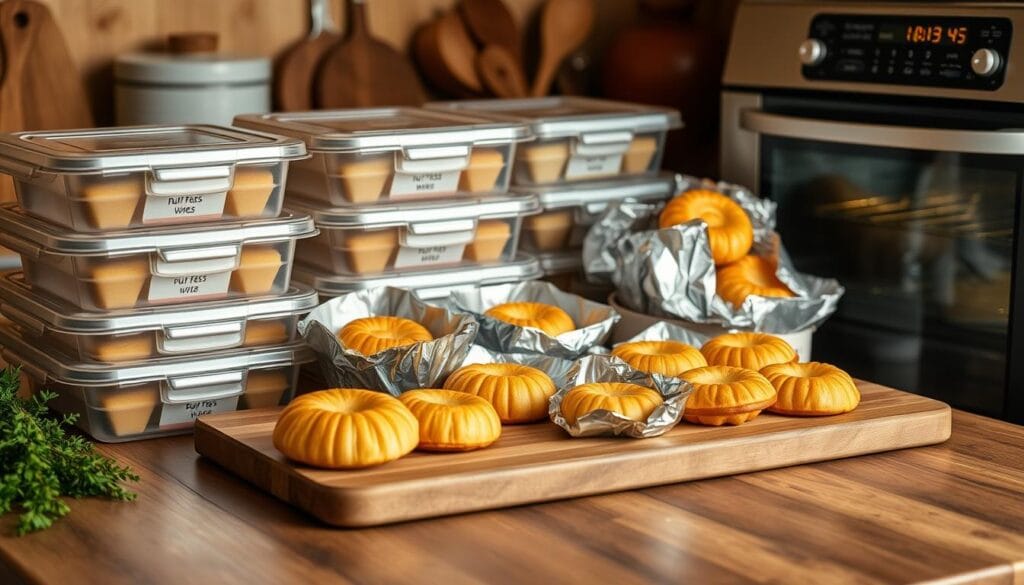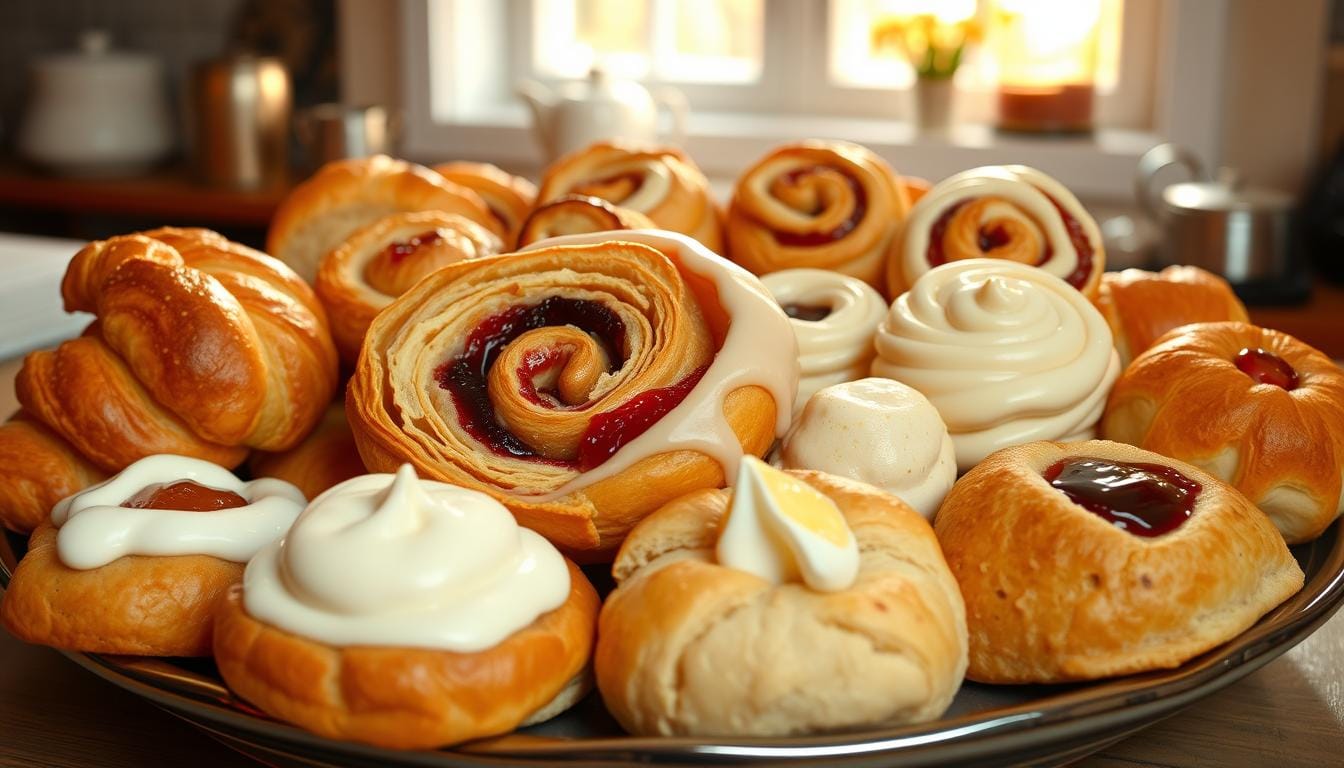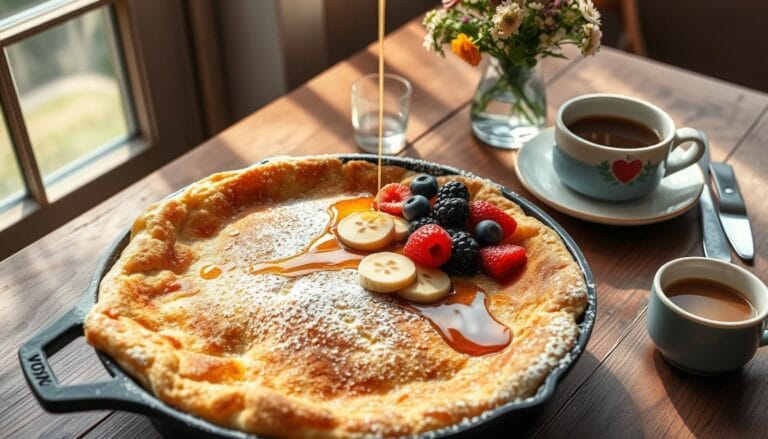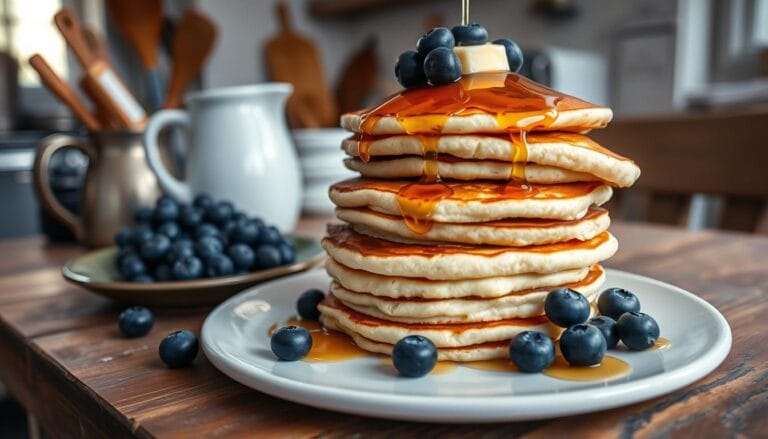Top 5 Classic Breakfast Pastries to Try This Weekend
Table of Contents
Top 5 Classic Breakfast Pastries to Try This Weekend
Every weekend morning is a chance for a special treat. Breakfast pastries make mornings extra special. They turn a simple start into a memorable moment.
Breakfast pastries are more than food. They wake up your senses and give you energy. Flaky croissants and sweet Danish rolls are just the beginning. They bring comfort and tradition to your table.
Finding the perfect breakfast pastry can make your weekend mornings unforgettable. Whether you love pastries or want to try something new, these classics are sure to impress. They will make your mornings special and create lasting memories.
Key Takeaways
- Breakfast pastries offer a delicious start to your day
- Classic pastries represent global culinary traditions
- Each pastry brings unique flavors and textures
- Homemade pastries can elevate the experience of weekend breakfast recipes
- Exploring different pastry styles broadens culinary appreciation
What Makes a Perfect Morning Pastry
Making the perfect puff pastry breakfast is an art. It’s not just about following a recipe. It’s about the little details that turn a simple dish into a special morning treat.
To make an amazing breakfast pastry, you need to master a few key skills. These skills will take your morning pastry to the next level.
The Art of Laminated Dough
Laminated dough is a secret trick used by pro bakers. It involves folding butter into the dough over and over. This creates flaky layers that make pastries irresistible.
- Use cold butter for optimal layering
- Maintain consistent dough temperature
- Practice precise folding techniques
Essential Ingredients for Breakfast Pastries
Choosing the right ingredients is crucial for great pastry dishes. Your morning pastry needs the best ingredients for flavor and texture.
| Ingredient | Purpose | Recommended Type |
|---|---|---|
| Butter | Creates flakiness | European-style, high fat content |
| Flour | Provides structure | Bread or pastry flour |
| Eggs | Adds richness | Fresh, room temperature |
Timing Your Morning Bake
Timing is everything when baking pastries. Knowing when to mix, rest, and bake is key. This ensures your pastries are golden, crisp, and delicious.
“Baking is a science, but cooking is an art. In pastry, they beautifully intersect.” – Unknown Pastry Chef
Now you have the knowledge to make breakfast pastries that will wow and delight.
French Croissants: The King of Breakfast Pastries
The French croissant is at the top of any breakfast pastries list. It’s a masterpiece of culinary art, turning simple ingredients into a heavenly morning treat. The croissant’s history goes back to the 13th century, with roots in the Austrian kipferl. It arrived in Paris in 1839.
Making the perfect croissant is a challenging task. Bakers use a special technique called lamination. They layer butter and yeasted dough to create the flaky, delicate texture that croissants are known for.
“A true croissant is an art form, not just a breakfast item.” – French Pastry Chef
Croissant Varieties
- Classic Butter Croissant
- Chocolate-Filled Croissant
- Almond Croissant
- Ham and Cheese Croissant
Every breakfast pastries list needs to include the croissant’s variety. From the classic butter version to the chocolate-filled ones, there’s something for everyone.
| Croissant Type | Key Characteristics | Best Paired With |
|---|---|---|
| Classic Butter | Pure, rich butter flavor | Black Coffee |
| Chocolate | Sweet chocolate filling | Hot Chocolate |
| Almond | Nutty, sweet topping | Cappuccino |
Croissants are loved by many, enjoyed on their own or with other breakfast items. They remain a favorite in the world of breakfast pastries.
Pain au Chocolat: A Chocolate Lover’s Dream
Breakfast pastries are a great way to start your day. Pain au chocolat is especially loved by chocolate fans. It turns simple ingredients into a treat that excites your taste buds.
The secret of pain au chocolat is its mix of flaky pastry and rich chocolate. Making these pastries takes skill and patience. They are the perfect morning treat.
Choosing Quality Chocolate
Choosing the right chocolate makes a big difference. Look for chocolate with these qualities:
- Minimum 60% cocoa content
- Single-origin chocolate bars
- Dark chocolate with subtle flavor notes
- Smooth texture without waxy appearance
Perfect Serving Temperature
The right temperature is key to enjoying pain au chocolat. It’s best when:
- Pastry is warm but not hot
- Chocolate is soft and slightly melted
- Exterior remains crisp and golden
Traditional vs Modern Variations
| Traditional Approach | Modern Twist |
|---|---|
| Classic butter-rich dough | Gluten-free alternatives |
| Dark chocolate filling | Mixed chocolate or flavored fillings |
| Hand-rolled technique | Machine-assisted preparation |
Pain au chocolat takes your breakfast to a new level. Whether you like traditional or modern versions, it’s a treat that makes mornings special.
“Life is short. Eat the pain au chocolat.” – Anonymous Pastry Lover
Danish Pastries and Sweet Fillings

Danish pastries are a true breakfast delight. They come from Denmark and are known for their variety of shapes and fillings. These treats make your morning breakfast feel like a gourmet meal.
Danish pastries, or Wienerbrød in Danish, are made with a special method. Bakers roll out thin dough and layer it with butter. This creates a flaky, tender pastry that’s a joy to eat.
“A perfect Danish pastry is a work of art, combining delicate layers with rich, sweet fillings.” – Danish Baking Tradition
Some favorite fillings for Danish pastries include:
- Cream cheese with berry compote
- Almond paste
- Fruit preserves
- Custard cream
- Marzipan
There are also unique Danish pastry types, like:
- Spandauer: A classic pastry with custard or marzipan filling
- Kanelsnurre: Cinnamon-spiced pastry knots
- Romsnegl: Rum-soaked sweet filling pastry
Here are some tips for baking Danish pastries:
- Use high-quality butter
- Keep the dough at the right temperature
- Let the dough rest between folding layers
With about 30 minutes of prep and a 400°F oven, you can make these tasty pastries at home.
Classic American Breakfast Pastries
American breakfast pastries take you on a tasty journey across the country. They show off the diversity and creativity of American breakfasts. Each pastry tells a story of regional flavors and traditions.
Regional Flavor Variations
Every region in the U.S. has its own special breakfast pastries. These treats reflect local tastes and cultural influences. Here are some favorites:
- New Orleans beignets – deep-fried, powdered sugar-covered delights
- New England whoopie pies
- Southern peach hand pies
- Midwestern apple turnovers
Popular Flavor Combinations
American breakfast pastries come in exciting flavors. Some top picks include:
- Apple cinnamon
- Blueberry cream cheese
- Maple pecan
- Chocolate hazelnut
Serving Suggestions
Here’s how to make your breakfast pastry experience even better:
| Pastry Type | Calories | Recommended Pairing |
|---|---|---|
| Cinnamon Roll | 429 | Dark roast coffee |
| Apple Pastry | 332 | English breakfast tea |
| Hazelnut Chocolate Chip Scone | 409 | Cappuccino |
Pro tip: Warm your pastries before serving to bring out their taste and texture. Enjoy them with your favorite morning drink for the perfect breakfast.
“Breakfast pastries are more than just food—they’re a delicious slice of American culinary heritage.”
Tips for Storage and Reheating

Learning how to store and reheat puff pastry breakfast can change your morning. Whether you made a batch or bought some, keeping it fresh is important. This way, you can enjoy that delicious taste again.
Storage Guidelines
Each breakfast pastry needs its own storage method. Here’s a quick guide to help:
- Room temperature storage: Best for consuming within 24-48 hours
- Refrigeration: Extends shelf life up to 5-7 days
- Freezing: Preserves quality for up to 2 months
Reheating Techniques
“The secret to reviving pastries is gentle, careful reheating,” says professional pastry chef Elena Martinez.
Here’s how to get your pastries crispy again:
- Oven method: Preheat to 300°F, warm for 5-7 minutes
- Toaster oven: Quick 2-3 minute reheat at medium setting
- Microwave: Use sparingly to avoid sogginess
Spoilage Warning Signs
Watch for these signs that your pastry has gone bad:
- Mold growth: Fuzzy green, blue, or white spots
- Unusual discoloration
- Unpleasant or sour odors
Pro tip: Cream-filled or fruit-based pastries spoil faster. They should be eaten within 1-2 days if not refrigerated.
Pairing Your Breakfast Pastries with Beverages
Choosing the right drink can make your breakfast pastry experience even better. It turns a simple meal into a special treat. Learning how to pair drinks with pastries can open up new flavors.
Coffee Companions for Your Pastries
Coffee is a classic choice for breakfast with pastries. Different types of coffee go well with different pastry textures and tastes.
- Espresso pairs perfectly with rich chocolate pastries
- Filter coffee matches lighter, flakier breakfast pastries
- Café au lait creates harmony with buttery croissants
Temperature and Flavor Synchronization
Temperature is key to enjoying your pastry and drink together. The right temperature can make the flavors pop and create unforgettable moments.
| Pastry Type | Recommended Coffee | Ideal Temperature |
|---|---|---|
| Croissant | Mild Filter Coffee | 60-65°C |
| Pain au Chocolat | Espresso | 65-70°C |
| Fruit Danish | Cappuccino | 55-60°C |
Beyond Coffee: Alternative Beverage Pairings
While coffee is popular, tea and juices are great alternatives. They add variety to your morning routine.
“The perfect pairing transforms a simple breakfast into a sensory experience.” – Pastry Chef Elena Rodriguez
Try different pairings to find your favorite. Your taste buds will enjoy the journey!
Conclusion
Your journey into breakfast pastries has shown you a world of flavors and traditions. From French croissants to Danish pastries, these treats are more than breakfast. They celebrate baking and cultural heritage.
The world of breakfast pastries is always changing. It shows how different cultures have shaped American food. These pastries have grown from simple breads to fancy treats that make our mornings better.
When you try making or eating breakfast pastries, you’re experiencing something special. They connect us to food traditions and add sweetness to our mornings.
Start exploring the world of breakfast pastries. Try new flavors and techniques. Your mornings will become more exciting with these delicious treats.
FAQ
What are the most popular types of breakfast pastries?
How long can I store breakfast pastries?
What makes a croissant truly authentic?
Can I make breakfast pastries at home?
What are the best beverages to pair with breakfast pastries?
Are there gluten-free breakfast pastry options?
What’s the difference between a Danish pastry and a croissant?
How do I reheat pastries without making them soggy?
Have you sampled our recipe yet?
There are no reviews yet. Be the first one to write one.







